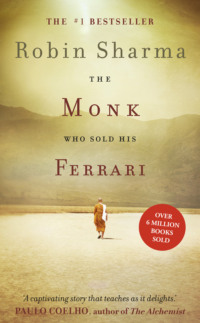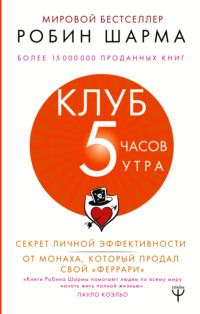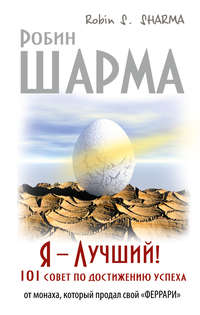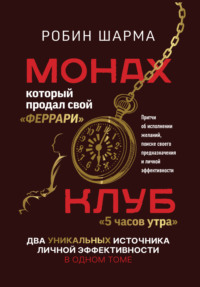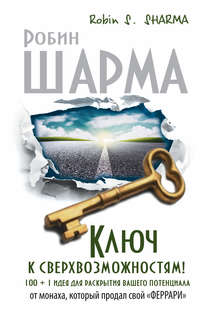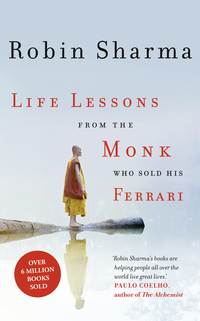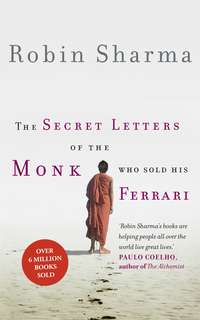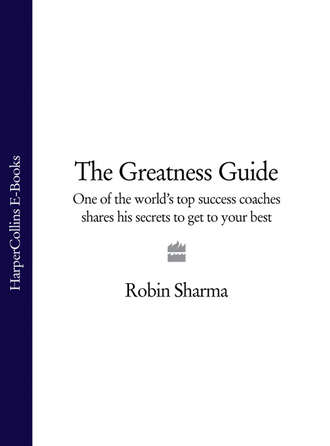
Полная версия
The Greatness Guide: One of the World's Top Success Coaches Shares His Secrets to Get to Your Best
The old expression is true: “Knowing how to read and not reading is almost the same as not knowing how to read.” Make the time to read something good each day. Fill your mind with big ideas and dazzling thoughts. Use books to flood your soul with hope and inspiration. And remember, if you want to lead, you really need to read. Oh, and if you—like me—have the habit of buying more books than you can ever possibly read, don’t feel guilty—you’re building your library. And that’s a beautiful thing.
7
Get Some Skin in the Game

I fail more than most people. I fail all the time. I’ve had failures in business. I’ve had failures in relationships. I’ve had failures in life. I used to wonder why this happened. I used to play Poor Me and suffer from the dreaded disease of victimitis infinitus. But now I get it. I’ve been stumbling toward my best life. Failure is the price of greatness. Failure is an essential ingredient for a high achievement. As innovation guru David Kelley wrote: “Fail faster. Succeed sooner.” You can’t win without leaving your safety zone and taking some calculated risks. No risk, no reward. And the more risks you take in the pursuit of your dreams, the more you are going to fail.
Too many among us live in what I call the safe harbor of the known. Same breakfast for 20 years. Same drive to work for 20 years. Same conversations for 20 years. Same thinking for 20 years. I have no judgment on that kind of a life. If it makes you happy, well, that’s great. But I don’t know of anyone who is happy living like that. If you keep doing what you’ve been doing, you’ll keep getting what you’ve been getting. Einstein defined insanity as doing the same things but expecting different results. Yet most people rule their lives that way. True joy comes when you put some skin in the game and take some chances. Yes, you will start to experience more failure. But guess what? Success also starts to pay more visits.
Failure is just part of the process of getting to world class. “Screw-ups are the mark of excellence,” said management consultant Tom Peters. The best companies on the planet have failed more than the average ones. The most successful people on the planet have failed more than ordinary ones. To me, the only failure is the failure to try and dream and dare. The real risk lies in riskless living. Mark Twain made the point perfectly when he observed: “Twenty years from now you will be more disappointed by the things you didn’t do than by the ones you did.”
The real risk lies in riskless living.
So go ahead, stretch today. Ask for the best table in your favorite restaurant. Ask for an upgrade to first class on your next flight (good luck). Ask your teammate at work for more understanding. Ask your sweetheart at home for more love. Do it. I dare you. And remember, you can’t win a game that you don’t even play.
8
Be into Breezes

I was at my tennis club a while ago with my kids, who are great players. I’m a great ball boy at best. A man who I guess would be in his early seventies comes up to me and starts a conversation. Interesting person. Lived a rich life so far. After a few moments, he closes his eyes and smiles. I ask: “What’s going on?” His reply was unforgettable: “Oh, nothing much. It’s just that I’m really into breezes.” Perfect.
Some of life’s best pleasures are its simplest ones. Enrich your life with more of them and your heart will be happy.
In this age of wanting more, needing more and having more, it was so refreshing to hear someone speak of the simple pleasures of life. I need to be clear: I have nothing against material things. Contrary to popular belief, The Monk Who Sold His Ferrari isn’t a manifesto against making money and enjoying the good life. My main message there was simply “remember what’s most important to leading a great life.” Drive a BMW, wear Prada, stay at the Four Seasons and earn a ton of money if these are things that make you happy. Life is certainly full of material pleasures that really do make the journey more delightful. No need to feel guilty about enjoying them. But please don’t forget about those basic but beautiful treasures to be loved along the way. Like deep human connections, realizing your best through fulfilling work, exploring the world and experiencing the glory of nature—like a sensational sunset that fills your soul or a full moon set against a star-filled sky.
Some of life’s best pleasures are its simplest ones. Enrich your life with more of them and your heart will be happy. And you can start with sweet breezes.
9
Make Time to Think

I am blessed to be able to meet interesting people from all walks of life regularly because of the work I do. I meet filmmakers, poets, brilliant college students, wise teachers and visionary entrepreneurs. Each one of these encounters has taught me something and shaped my perspective. I had dinner recently with one of Asia’s top CEOs. Asked him the secret of his outrageous success. He smiled: “I make the time to think.” Every morning, he spends at least 45 minutes with his eyes closed, deep in reflection. He’s not meditating. He’s not praying. He’s thinking.
Sometimes he’s analyzing business challenges. Other times he’s thinking about new markets. Still other times he’s being introspective on the meaning of his life and what he wants it to stand for. Often, he’s simply dreaming up new ways to grow personally and professionally. Every once in a while, he’ll spend between six and eight hours doing this. Sitting silently. Still. With his eyes closed. Thinking.
Making the time to think is a superb strategy for success at leadership and in life. Too many people spend the best hours of their days solely engaged in doing, on the execution aspect of things. Recently a client said to me: “Robin, sometimes I get so busy that I don’t even know what I’m so busy doing.” But what if he’s busy with the wrong things? Few things are as disappointing as investing all your time, energy and potential climbing a mountain only to find—once at the top—that you climbed the wrong one. Thinking and reflection ensures that you’re on the right mountain. Peter Drucker, the management expert, said it so well: “There is nothing so useless as doing efficiently that which should not be done at all.”
Peter Drucker, the management expert said
it so well: “There is nothing so useless as doing efficiently that which should not be done at all.”
Being thoughtful and strategic is step number one as you walk to greatness. Clarity precedes success. By thinking more, you will have a better sense of your priorities and what you need to focus on. Your actions will be more crisp and deliberate and intentional. You will make better decisions and wiser choices. More time thinking will make you less reactive. You’ll become clearer on the best uses of your time (which will, in turn, save you time). And your “think time” will provoke some amazing ideas and inspire some big dreams. Lewis Carroll addressed this point beautifully in Alice in Wonderland when he wrote:
‘“There’s no use in trying,’ said Alice. ‘One can’t believe impossible things.’ ‘I daresay you haven’t had much practice,’ said the Queen. ‘When I was your age, I always did it for half an hour a day. Why sometimes I’ve believed as many as six impossible things before breakfast.’”
10
Leadership Begins on the Extra Mile

I had just dropped off Colby and Bianca at school and was driving to the office when I got an insight that made me pull over. So here I sit, off to the side of the road with my hazard blinkers on, hammering this out on my BlackBerry because I wanted to share it with you. The big idea: Leadership—and success—begins on the extra mile.
Ordinary people don’t spend
much time on the extra mile. But who ever said you were ordinary?
Leadership is shown when a salesperson makes extra calls at the end of an exhausting day—not because it’s the easy thing to do but because it’s the right thing to do. Leadership is shown by the manager who finishes a report that has taken the very best from him, then goes back to it a little later to polish and improve it even more. Leadership is shown by a team that delivers on their value promise to a customer and then digs even deeper to wow them. And leadership is shown by the human being who fights the urge to stay under the covers on a cold day and throws on her running shoes to pound the pavement. Not because running miles on a frosty morning is fun. But because it’s wise.
Please think about this idea. I think it’s a deeply important one. Those among us who craft extraordinary careers and spectacular lives are those who spend most of their time giving their best out on the extra mile. Yes, ordinary people don’t spend much time on the extra mile. But who ever said you were ordinary?
11
Mick Jagger and Reference Points

Last Monday night I watched a 62-year-old man rock the house for more than two hours in front of 30,000 adoring fans. Yup, Mick is 62 and the once young Stones frontman is aging. But he still has that charisma. Still has the moves. Still has the youth.
As I watched him, I thought of a term I’ve been sharing at my seminars these days: “reference points.” I heard someone say last week: “I’m in my sixties—getting near the end of my life.” Not if Mick is your reference point.
Positive reference points will pull you into a new way of seeing things and introduce you to a new set of possibilities. Doors you never even knew existed will begin to open. Lance Armstrong is a great reference point on persistence. My father is a great reference point on integrity. My mother is an excellent reference point on kindness. My children are superb reference points on what unconditional love and boundless curiosity look like. Richard Branson is a spectacular reference point on living a full-out life. Madonna is a great reference point on reinvention. Peter Drucker was a wonderful reference point on the importance of lifelong learning. Nelson Mandela is a brilliant reference point on courage and humanitarianism.
Often, we have weak reference points so we see the limitations of a scenario rather than the opportunities. With world-class reference points, you will realize far more of your potential and life will have more wonder. You will play a bigger game as a human being if you pick the right people to model. We are all cut from the same cloth. We are all flesh and bones. If they can get to greatness—so can you. You just need to do the same kinds of things your reference points did to reach their excellence.
Positive reference points will pull you
into a new way of seeing things and introduce you to a new set of possibilities. Doors you never even knew existed will begin to open.
And I’ll tell you one thing: When I’m 62, I want to be like Mick. Because he’s just getting started.
12
Business Is Relationships

I’m sitting on a plane in Frankfurt as I write this chapter. I spent yesterday meeting with publishers who have distributed The Monk Who Sold His Ferrari series around the world. Each autumn, Frankfurt comes alive as 250,000 publishing people descend on the city for the world’s largest book fair. For me, today marks the last day of a 20-day speaking and book tour that took me throughout India (one of my favorite countries to visit) to Istanbul (a fantastic place) and finally to this small German city. Learned so much these past three weeks. Met so many amazing human beings who blessed me with their kindness. Been moved by the sea change of people who are reaching for their greatest lives and leading by example. Perhaps most of all, I’ve been reminded that few things are more important than building relationships.
How easy it is to forget that, ultimately, business and life is all about forging human bonds. Being out on this tour, I laughed with my readers at book signings. I broke bread with the clients we do leadership development work for. I drank coffee with my publishers. I got to know the people in this community that has grown around my message. And they got to know me.
Big idea: People want to know that you are real. That you are decent, kind and trustworthy. They want to feel you and sense you and look into your eyes to see what you are made of. They want to know your passion for whatever it is you stand for. And when they sense that you are the real deal, they will open up to you. When they see that you have their best interests in mind, they will trust you—and keep your best interests in mind. Once they get that you are good, they’ll be good to you. And your career (along with your life) will get to a place called world class based on those trust connections. It’s easy to forget that people do business with people they like—and who make them feel good. Simple stuff—I know. Yet most of us just don’t get around to becoming masterful at the basics. Success is all about consistency around the fundamentals. The only thing that’s rocket science is rocket science.
It’s easy to forget that people do business with people they like.
So I invite you to get out of your office and go circulate. Being out there makes good things happen. Nothing really happens until you move. Shake hands. Do lunches. Show genuine interest. Spread your goodwill. Evangelize your message. Remember that before someone will lend you a hand, you need to touch their heart. And that business is all about relationships.
13
Life Lessons from SpongeBob SquarePants

SpongeBob SquarePants is my hero. The kids and I were having breakfast this morning when Bianca, my nine-year-old daughter, brought up the subject of this crazy little cartoon character. “Daddy, is SpongeBob a real person?” Made me laugh. Then it made me think. If SpongeBob were a human being, this world would be a better place. Seriously. Here are four lessons SpongeBob can teach us to get more joy from life:
BE THE ETERNAL OPTIMIST. The guy (or sponge, I should say) always sees the best in any situation. Your thinking really does shape your reality. And because SpongeBob looks for the best, he finds it.
VALUE PEOPLE. SpongeBob knows what friendship means. He loves his pals in Bikini Bottom, even Squidword “who is always cranky,” to borrow my son’s words. SpongeBob knows that respect and putting people first are two of the most important elements for strong relationships.
BE AN ORIGINAL. SpongeBob is one of a kind. Too many among us are afraid to be ourselves. So we give up our dreams to follow the crowd. Tragic. “To thine own self be true,” wrote Shakespeare. Have the courage to be your true—and greatest—you. (Warren Buffett, chairman of Berkshire Hathaway, once said, “There can’t be two yous.”)
Too many among us are afraid to be ourselves. So we give up our dreams to follow the crowd.
LAUGH AND HAVE FUN. There’s no point in being successful but sad. Makes no sense. Yes, reach for the mountaintop. But enjoy the climb as well. Life wasn’t meant to be an ordeal. It was meant to be a celebration. So have big-time fun as you chase—and catch—your most cherished dreams.
14
How to Be a Happier Human

Here’s a simple idea that has worked brilliantly for the executives and entrepreneurs who I coach: If you want to be happier, do more of the things that make you happy. I know that seems like an obvious point—but it’s not. As we leave the wonder years of childhood, most of us stop doing the things that make our hearts sing. One CEO client told me recently that when he was young, he used to love to take long solo rides on his bicycle. “I stopped doing that when we had kids and work demands took over. Life just got busier. But those moments out on that bike came from some of the best days of my life.” Another client, a phenomenally successful entrepreneur, shared that his passion used to be playing his drums in a rock band. “Those were incredible times. Then I started my business and it began to consume me. I miss playing music. I’d lose myself in it.”
Here’s your To Do: Make a list of your 10 Greatest Passions, 10 activities that fill your heart with joy and remind you of how good life can be. And then, over the coming 10 weeks, inject one of those pursuits into your weekly schedule. Powerful thought: The things that get scheduled are the things that get done. Until you schedule something, it’s only a concept—and extraordinary people don’t build remarkable lives on concepts. They build their greatness on action and near-flawless execution around their deliverables. They get things done.
This 10-week program works. When you get back to doing those things that lifted your spirit and sent you soaring, you reconnect with that state of happiness that you may have lost. And part of the purpose of life is to be happy. Really happy.
15
Work Hard, Get Lucky

That old line remains so true: “The harder I work, the luckier I get.” Life helps those who help themselves. Learned that one from personal experience. I’m not one of those New Age types that believes “it’s all meant to be” and that our lives have been scripted by an invisible set of hands. That kind of talk smacks of “victimspeak” and fear. Fear of failure. Fear of rejection. Fear of not being good enough. Fear of success. That kind of language also lacks any sense of personal responsibility and usually comes from people too afraid to get into the game. Sure I believe that there’s a force of nature that comes into play when we least expect it (and most need it). And yes, I believe there is a coherence to the way our lives unfold that is highly intelligent. But I also believe—deeply—that we were given free will and the power to make choices for a single reason: to exercise them. I believe that we generally get from life what we give to life. I believe that good things happen to those willing to put in the effort, exercise discipline and make the sacrifices that personal and professional greatness requires—no, demands. I’ve also found that actions have consequences and the more good things I do—through good old hard work—the more success I see. Life favors the devoted.
Not one of the über-successful people I’ve worked with as a leadership coach got there without outworking everyone around them. While others were home watching TV or sleeping, these great ones—who have made their mark on the world and have added tremendous value to it—were up early, putting in the hours, showing life that they were dedicated to their dream. I’m not—for even a moment—denying the importance of work-life balance and spending time with loved ones or caring for your inner life. I’ll be the first to stand for those values. All I’m saying is that behind extraordinary achievement you will always discover extraordinary effort. Just a law of nature. Hasn’t changed for a thousand years.
Not one of the über-successful people I’ve worked with as a leadership coach got there without outworking everyone around them.
Ivan Seidenberg, the chairman and CEO of Verizon, tells the following story: “My first boss—he was the building superintendent and I was a janitor—watched me sweep floors and wash walls for almost a year before he mentioned I could get tuition for college if I got a job with the phone company. When I asked him why he waited so long, he said: ‘I wanted to see if you were worth it.’”
And Time Warner CEO Dick Parsons once observed that the best advice he ever got was from his grandmother. She told him: “Whatever a man soweth, that shall he also reap.” So plant your seeds. Be spectacularly great at what you do. Wear your passion on your sleeve and hold your heart in the palm of your hand. And work hard. Really hard. Hard work opens doors and shows the world that you are serious about being one of those rare—and special—human beings that uses the fullness of their talents for the highest and the very best.
16
Know Your Genius

Genius is not the sole domain of a rare breed of person. Both you and I are entitled to that label and to play in that space—if we so choose. Here’s the big idea: Focus on any area or skill with a relentless devotion to daily improvement and a passion for excellence and within three to five years, you will be operating at a level of competence (and insight) such that people call you a genius. Focus plus daily improvement plus time equals genius. Understand that formula deeply and your life will never be the same.
Michael Jordan was a basketball genius. Was his spectacular success on the court purely the result of natural gifts? Absolutely not. He took what nature gave him and ran the formula: Focus plus daily improvement plus time equals genius. He didn’t try to be good at five different sports. He didn’t scatter his focus. He just got devoted to being brilliant at basketball. And he was.


